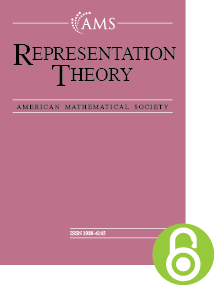The adjoint representation of a reductive group and hyperplane arrangements
HTML articles powered by AMS MathViewer
- by J. Matthew Douglass
- Represent. Theory 3 (1999), 444-456
- DOI: https://doi.org/10.1090/S1088-4165-99-00066-7
- Published electronically: November 9, 1999
- PDF | Request permission
Abstract:
Let $G$ be a connected reductive algebraic group with Lie algebra $\mathfrak g$ defined over an algebraically closed field, $k$, with $\operatorname {char} k=0$. Fix a parabolic subgroup of $G$ with Levi decomposition $P=LU$ where $U$ is the unipotent radical of $P$. Let $\mathfrak u=\operatorname {Lie}(U)$ and let $\mathfrak z$ denote the center of $\operatorname {Lie}(L)$. Let $T$ be a maximal torus in $L$ with Lie algebra $\mathfrak t$. Then the root system of $(\mathfrak g, \mathfrak t)$ is a subset of $\mathfrak t^*$ and by restriction to $\mathfrak z$, the roots of $\mathfrak t$ in $\mathfrak u$ determine an arrangement of hyperplanes in $\mathfrak z$ we denote by $\mathcal A^{\mathfrak z}$. In this paper we construct an isomorphism of graded $k[\mathfrak z]$-modules $\operatorname {Hom}_G(\mathfrak g^*, k[{G\times ^P(\mathfrak z+\mathfrak u)}]) \cong D(\mathcal A^{\mathfrak z})$, where $D(\mathcal A^{\mathfrak z})$ is the $k[\mathfrak z]$-module of derivations of $\mathcal A^{\mathfrak z}$. We also show that $\operatorname {Hom}_G(\mathfrak g^*, k[{G\times ^P(\mathfrak z+\mathfrak u)}])$ and $k[\mathfrak z] \otimes \operatorname {Hom}_G(\mathfrak g^*, k[G \times ^P \mathfrak u])$ are isomorphic graded $k[\mathfrak z]$-modules, so $D(\mathcal A^{\mathfrak z})$ and $k[\mathfrak z] \otimes \operatorname {Hom}_G(\mathfrak g^*, k[G \times ^P \mathfrak u])$ are isomorphic, graded $k[\mathfrak z]$-modules. It follows immediately that $\mathcal A^{\mathfrak z}$ is a free hyperplane arrangement. This result has been proved using case-by-case arguments by Orlik and Terao. By keeping track of the gradings involved, and recalling that $\mathfrak g$ affords a self-dual representation of $G$, we recover a result of Sommers, Trapa, and Broer which states that the degrees in which the adjoint representation of $G$ occurs as a constituent of the graded, rational $G$-module $k[G\times ^P \mathfrak u]$ are the exponents of $\mathcal A^{\mathfrak z}$. This result has also been proved, again using case-by-case arguments, by Sommers and Trapa and independently by Broer.References
- Walter Borho, Über Schichten halbeinfacher Lie-Algebren, Invent. Math. 65 (1981/82), no. 2, 283–317 (German, with English summary). MR 641132, DOI 10.1007/BF01389016
- Abraham Broer, The sum of generalized exponents and Chevalley’s restriction theorem for modules of covariants, Indag. Math. (N.S.) 6 (1995), no. 4, 385–396. MR 1365182, DOI 10.1016/0019-3577(96)81754-X
- Lawrence M. Graves, The Weierstrass condition for multiple integral variation problems, Duke Math. J. 5 (1939), 656–660. MR 99, DOI 10.1007/978-94-015-9131-7_{2}
- Lawrence M. Graves, The Weierstrass condition for multiple integral variation problems, Duke Math. J. 5 (1939), 656–660. MR 99, DOI 10.1007/978-1-4612-1770-1_{5}
- Bertram Kostant, Lie group representations on polynomial rings, Amer. J. Math. 85 (1963), 327–404. MR 158024, DOI 10.2307/2373130
- Peter Orlik and Louis Solomon, Coxeter arrangements, Singularities, Part 2 (Arcata, Calif., 1981) Proc. Sympos. Pure Math., vol. 40, Amer. Math. Soc., Providence, RI, 1983, pp. 269–291. MR 713255, DOI 10.1090/pspum/040.2/713255
- Peter Orlik and Hiroaki Terao, Arrangements of hyperplanes, Grundlehren der mathematischen Wissenschaften [Fundamental Principles of Mathematical Sciences], vol. 300, Springer-Verlag, Berlin, 1992. MR 1217488, DOI 10.1007/978-3-662-02772-1
- Peter Orlik and Hiroaki Terao, Coxeter arrangements are hereditarily free, Tohoku Math. J. (2) 45 (1993), no. 3, 369–383. MR 1231562, DOI 10.2748/tmj/1178225890
- Eric Sommers and Peter Trapa, The adjoint representation in rings of functions, Represent. Theory 1 (1997), 182–189. MR 1457243, DOI 10.1090/S1088-4165-97-00029-0
Bibliographic Information
- J. Matthew Douglass
- Affiliation: Department of Mathematics, University of North Texas, Denton, Texas 76203
- Email: douglass@unt.edu
- Received by editor(s): March 8, 1999
- Received by editor(s) in revised form: September 28, 1999
- Published electronically: November 9, 1999
- © Copyright 1999 American Mathematical Society
- Journal: Represent. Theory 3 (1999), 444-456
- MSC (1991): Primary 22E46
- DOI: https://doi.org/10.1090/S1088-4165-99-00066-7
- MathSciNet review: 1722107


